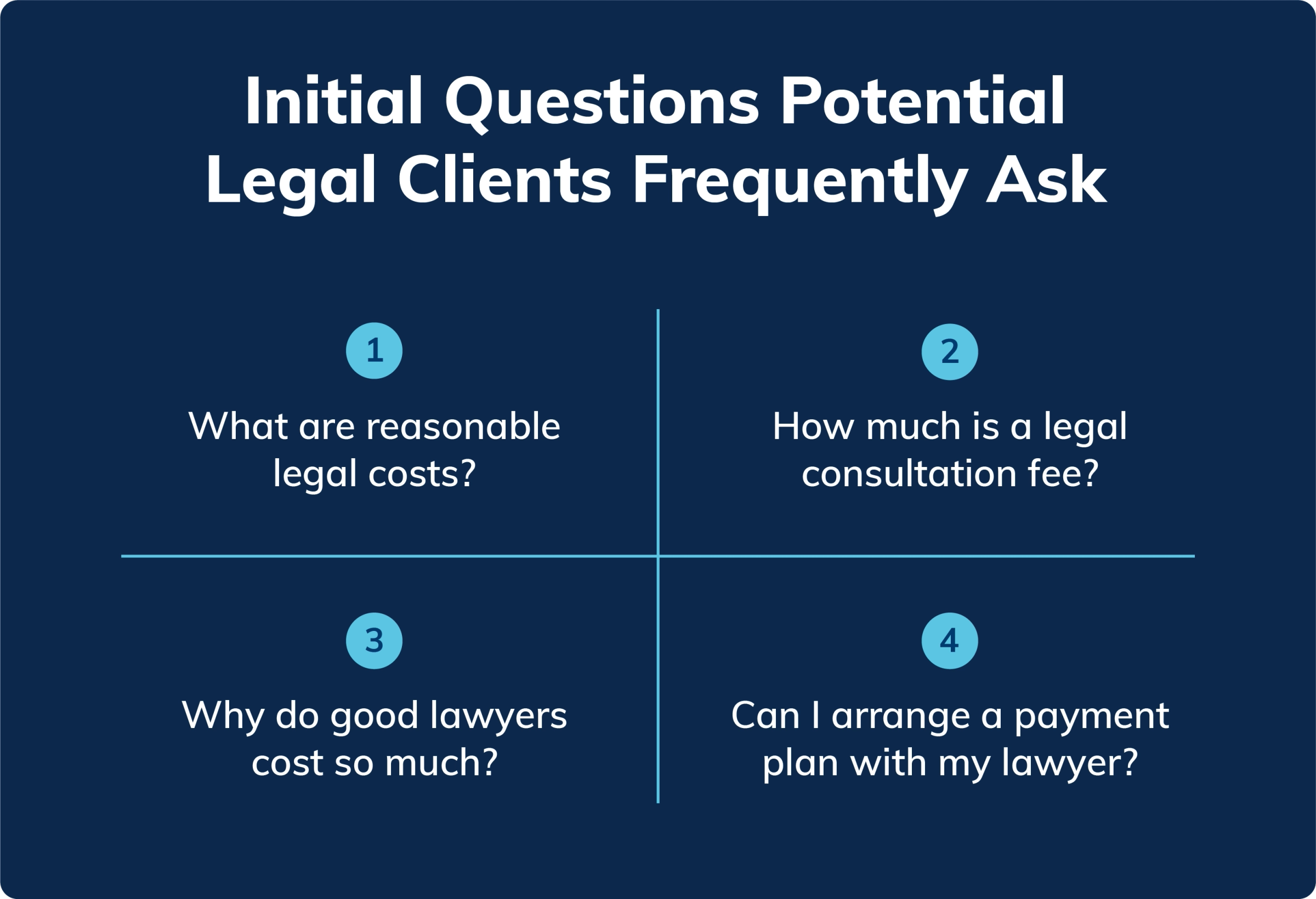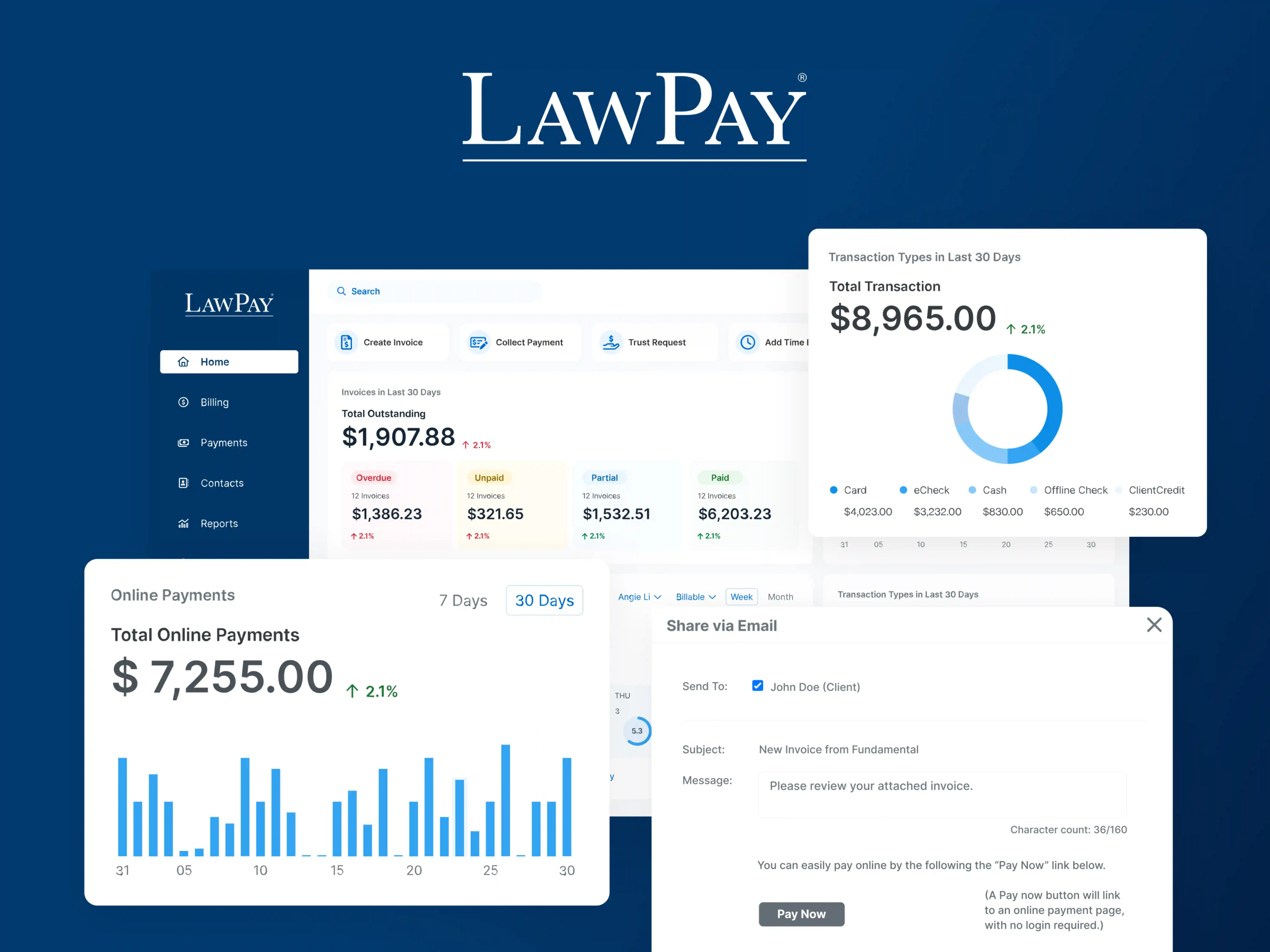Modern consumers demand convenience, security, and flexibility when paying for their goods and services, and like it or not, legal clients are no different. If your firm fails to provide these modern payment options, you risk falling short of client expectations. A poor client experience can snowball into a whole host of problems for your firm, including low client retention, little to no client referrals, and ultimately hurting your law firm's profitability.
In the age of Venmo, PayPal, and Square, cash and paper checks have become dated relics of the past. Your clients expect the convenience of electronic payments, so much so that they probably have their payment information saved on their computers and phones to avoid the hassle of manually typing in card numbers. Modern clients are busy and prefer to avoid the hassle of coming into an office to pay in person.
Long story short, failing to provide various payment options means leaving your hard-earned revenue on the table. The following information will help you understand the compliance risks of lawyer payment options and show you how to choose and implement convenient law firm payment methods.
Are Lawyers Allowed to Accept Online Payments?
The trend of clients paying their legal fees online or with a credit card is undeniable, but are lawyers allowed to accept payments online? The short answer is yes.
These days, even individuals at farmers markets and crafts fairs can take credit cards, tap-to-pay, and other forms of contactless payment—yet many lawyers still cling to outdated payment terms and technologies. Lawyers who don’t have easy, online payment methods available risk being seen as old-fashioned or out of touch.
Not only are digital payments more popular, they’re also widely seen as more secure than checks. However, if your firm is going to accept online legal payments, there are a few considerations to keep in mind.
Paying Lawyers Digitally: Ethics to Consider
It's not inherently risky for attorneys to accept payments online, but they still have to comply with all the legal and ethical requirements. In particular, lawyers might struggle with using electronic payment solutions while complying with the rules requiring the separation of client and third-party funds from the lawyer's operating funds.
Payment processing fees create another thorny ethical area. All online payments to a lawyer go through a payment processor that helps facilitate the transaction and keep it secure. In exchange, they charge a fee (usually 1.5 – 3.5% of the total transaction). In some states, there are rules against adding surcharges to compensate for these fees. Additionally, to avoid commingling funds, processing fees for attorney payments should be deducted from a firm’s operating account rather than from a trust account.
Credit card chargebacks (while rare) also must come from a lawyer’s operating expenses, not client funds, to maintain legal payment ethics.
Last, any payment method you use must be secure and encrypted. This ensures that a client’s personal information stays safe.
Using a legal payment solution, like LawPay, that’s explicitly made for attorneys, is the best way of keeping your transactions above board and secure.
5 Legal Payment Types To Accept at Your Firm
Across nearly every industry—from grocery shopping and buying clothes to paying for travel and rent—it’s never been easier to pay. Yet, when we asked lawyers about client payment in our 2025 Legal Industry Report, a shocking 68% of them stated that collecting legal fees was still a major challenge.
Generally speaking, the easier it is to pay for something, the more likely people will do it. Imagine you ordered a new set of pans from an online retailer, but they only accepted payment by check or bank transfer. As a gesture of goodwill, they ship you the pans while waiting for payment, but now it’s on you to dig up that checkbook or bank information.
Maybe days or weeks go by, and you still haven’t paid for your new pans. It’s not that you don’t intend to pay, but you’re busy and don’t have easy access to that payment information. This is what many clients feel when faced with paper bills and other antiquated payment models.
However, advances in legal technology have made it significantly easier for law firms to modernize the payment experience and offer clients multiple ways to pay. So, what forms of payment do lawyers accept? There are currently five main ways to offer payment to lawyers online.
When considering which legal payment types to offer in your firm, ensure you assess the pros and cons of each.
1. Credit/Debit Cards
Offering online credit card payments is one of the most common and popular options for law firms for multiple reasons:
Pros:
It's familiar: For many clients, credit card payments are already their preferred payment method in their day-to-day life.
It's more convenient: Online credit card payments allow clients to pay their legal bills quickly, easily, and securely. Like credit cards, debit payment options provide clients the convenience, efficiency, and familiarity they want and expect. A recent study noted that 40% of clients would never hire a lawyer who didn't take credit or debit cards.
It helps your firm get paid faster: When it's easier for clients to pay, they tend to pay their legal bills sooner. Moreover, online card payments reduce the delay between the client making a payment and your firm receiving it. Data tells us firms get paid 39% faster when collecting fees via a secure online credit card payment platform, compared to other means.
Cons:
Credit card processing fees: If you accept credit cards as payment for your services, you'll have to deal with credit card processing fees. Why? There's a cost to moving money in our financial system. However, the impact of faster payments and increased cash flow generally offsets late payments and the processing fees associated with credit cards.
Requires careful accounting: Law firms must have special accounting processes in place to maintain IOLTA compliance, which can help them avoid the ethical pitfalls associated with credit card processing fees and chargebacks.
2. PayPal, Stripe, and Third-Party Payment Processors
Online payment systems, like PayPal and Stripe, are popular since they handle the complexities of digital payments.
Pros:
It’s convenient and widely used: PayPal offers a convenient, easy-to-use payment option that appeals primarily to a younger demographic, which may be particularly attractive to lawyers focused on bringing in this type of client.
Reduces security risk: When using a 3rd party payment processor, they take on the responsibility of keeping your and your clients’ financial details secure.
Cons:
Takes a cut of your payments. PayPal and many similar services charge an additional fee for any business transaction. They also have higher withdrawal charges if you want instant access to your money.
Requires additional accounting vigilance: Payments accepted via platforms like PayPal may not follow all ethical and compliance rules. As mentioned earlier, the nature of PayPal could make it challenging to ensure compliance when accepting payment for retainers or funds for a trust account.
The rules for accepting payments for legal services vary: Be sure to check your state's laws about which online payment systems for lawyers are accepted to ensure you stay compliant.
3. eChecks
An electronic check—or eCheck—serves as a digital version of a traditional paper check. NOTE: To accept eChecks, law firms must use an online payment solution that includes eChecks as a payment method.
Pros:
There are fewer fees than with credit cards: eChecks are not subject to the same processing fees as credit cards, making them a cheaper option for both clients and law firms, especially for larger transactions.
It’s straightforward: eChecks function similarly to paper checks. Clients can pay their bills directly from their online bank account instead of writing a check.
Less chance of chargebacks or failed transactions: Because clients have to explicitly approve eCheck transactions, there’s much less chance of disputes arising. Additionally, while a client’s credit card number may change periodically, their bank account numbers will likely stay the same, making it easier to keep payment information up to date.
Cons:
Need for strong data security: Clients are giving you their bank details directly; you must ensure that any platform you use is fully secure to prevent ethical violations and fraud.
Less convenient than credit cards: An eCheck still requires clients to look up their banking details, which is less convenient than simply entering a credit card number.
4. Legal Fee Funding
Fee Funding is a type of short-term financing that allows consumers to make purchases and pay for them at a future date, often interest-free. Since 2020, the popularity of this type of payment has exploded, with 50% of Americans using fee funding to make a purchase. Through legal fee funding, clients can pay for services over time while the firm receives the total amount upfront.
Pros:
More reliable cash flow: Firms receive the total invoiced amount upfront, while clients get an automated payment plan that meets their financial needs.
Receive the total fee upfront: Unlike traditional legal services financing, you receive multiple smaller deposits; fee funding means you can secure your total requested amount in advance.
Accommodates different payment methods: Easily accommodate the evolving payment preferences of modern legal clients and cut down on time spent chasing after overdue invoices.
Cons:
Many clients are unfamiliar with it: Because of its relative newness, some law firms and clients might be hesitant to recognize legal fee funding as a viable form of payment.
Limited compatibility with legal payment platforms: It can be challenging to locate a payment platform that offers fee funding as an option.
5. Payment Plans
Many law firms are offering payment plans that split up legal bills into smaller, more manageable payments to make their services more client-oriented. As the cost of living rises and budgets grow tighter, legal payment plans are an increasingly attractive option for many clients.
Pros:
Helps your firm be more client-oriented: Offering payment plans is part of a more client-oriented service structure that seeks to take clients’ financial worries and limitations into account, giving you a valuable marketing tool to diversify your client base.
More likely to get partial payments: Legal fees are a big expense, and some clients simply can’t afford to pay such a large sum right away. However, instead of getting no payment at all, a payment plan allows lawyers to take installments, which is beneficial for maintaining cash flow.
Cons:
It comes with more risk: Giving clients more flexibility in how much they pay and when comes with the risk of clients not paying you. This is why screening potential clients is so important if you offer payment plans.
Creates more admin: Tracking and following up on payments can already take up a lot of time. Tracking partial payments adds to a lawyer’s administrative burden.
Creates potential cash flow problems: While having several clients on payment plans can be a boon for regular cash flow, the smaller payments can inherently create cash flow problems compared to receiving the full amount at once.
Law Firm Best Practices for Communicating Pricing and Arranging Payments

Before you begin exploring how you can build your law firm's online payment processes to cater to the modern legal landscape, we invite you to enter the mind of a standard legal client. All of the following are questions current and potential legal clients frequently ask:
What are reasonable legal costs?
How much is a legal consultation fee?
Why do good lawyers cost so much?
Can I arrange a payment plan with my lawyer?
No surprise, money is top of mind for many legal clients. As a legal professional, you want to help your clients and offer top-notch service. But at the end of the day, you are performing a job, and you need to collect the money you are owed.
While offering modern attorney payment is a great start, here are some additional best practices to follow to ensure your billing and invoicing processes run smoothly.
Be Clear and Transparent
Complete transparency with your payment terms ensures no surprises for clients or attorneys alike. To ensure your clients feel prepared to incur the costs associated with legal representation (and so that you don't find yourself chasing down unpaid invoices), be clear with your costs and available legal payment types upfront.
Take the time to lay out the type of payments you accept, the frequency of payment, your hourly rate, flat fees, and how you'll collect payments. Try to get into your client’s head and anticipate the types of questions they’ll have and address them during the onboarding process. You may even create a document or FAQ page on your website that answers common payment questions or gives examples.
Set Attorney Payment Rates Specific to Location and Experience
Additionally, you'll want to ensure that your rates are commensurate with your geographic location, target client demographic, and your area of law and experience. If you’re vastly overcharging or undercharging for your services, you’re likely to run into law firm cash flow problems later on.
Lawyers don't always determine the appropriate value for their services or fail to adjust rates to keep up with changing economic times—that's why doing your research is so important. Ask colleagues, mentors, and other legal professionals in your area how much they charge, and compare your law firm's billable rates for different types of cases with those of other legal professionals in your geographic region who handle similar cases.
As a starting point, consider looking at employment data via the Bureau of Labor Statistics, which shares the average salaries for lawyers nationwide. Some state bar associations also publish industry trends on salary, breaking those down further by law firm type and practice areas.
In addition to looking at the fees, you should also see how your competitors collect payments. By offering payment plans and other convenient online payment methods, you may not have to undercut a competitor’s price and instead offer a better, more modern client experience.
Offer a Variety of Attorney Payment Options
Offering a greater variety of payment methods, including online payments, leads to faster payments and more substantial cash flow. In fact, according to the 2025 Legal Industry Report, 14% of legal professionals who provide online payment options saved 6-10 hours per month, while 10% saved over 11 hours per month. Additionally, 59% of legal professionals stated that accepting credit and debit cards increases their firm's collection rates.
Additionally, providing various convenient lawyer payment methods is one way to prioritize the client-centered experience.
How Can Lawyers Simplify Billing?
A successful law firm must have streamlined and transparent billing practices. More likely than not, you know how important it is and have taken steps to reduce inefficiencies in your law firm's billing processes, but how?
Here are a few expert tips to create a more consistent (and easier) billing and invoicing process:
Be thorough with your bills: Record every task you've performed for your client's case, including every significant step along the way. Many legal professionals will record their tasks in 10-15 minute increments, with some going as detailed as six minutes at a time. Legal practice management software, like MyCase, can help make this process less tedious.
Record your tasks as soon as you complete them: Try to document work as soon as it's done or as close to completion time as possible. If you delay, you may be distracted by another task and unable to remember the details accurately. Time tracking software can both simplify tracking billable hours and help you invoice more accurately and more transparently.
Maintain a consistent billing schedule: Plan a consistent time and date to send your bill out every month. This ensures your client can anticipate your bill in advance and pay it more promptly. Also, try to list the line items in plain language. Most clients will not be familiar with legal jargon, and if they can easily understand the charges on their bill, there's less chance they'll contest or find them suspicious.
When building a billing process that works well for you and your clients, an all-in-one billing payment solution is the best place to start. By connecting your billing and payment processes, you can create smooth, streamlined workflows to save time and money.
Recommended: Law Firm Billing: The Lawyer's Complete Guide
How to Choose the Right Legal Payment for Your Law Firm?
Ultimately, the question you should be asking yourself is not whether or not you should offer online payments at your law firm, but which payment method is the best fit. Online payments are a necessity for offering clients a better experience, making payments more secure, and getting paid faster.
If you’re not sure which methods for paying a lawyer are the best fit for your firm, these are the key factors you need to take into account.
Account for Client Preferences
While online payments are more popular than paper or cash, the blanket term “online payments” is a little misleading. Customers don’t just prefer any online payment type, but usually prefer specific payment methods.
Understanding not only what payment methods are popular (and appropriate) with your client demographics but also why they prefer those types of payments is important to improving the client experience.
For example, clients may prefer using services like PayPal because it saves their card information for them. Conversely, they may like an eCheck because it reduces fees and “feels” more secure for large transactions than a simple credit card portal.
If you offer multiple forms of payment, consider including a question about payment methods on any follow-up questionnaires or keep an eye out for any mention of the billing process in online reviews.
Factor in Payment Method Costs
Just as different online payment methods aren’t created equal from the user experience standpoint, they also aren’t all equal financially. Even for the same service, payment rates can differ based on what payment method was used (e.g., a credit card vs. a digital wallet payment vs. a debit card).
Because payment processing fees will be coming directly out of your operating expenses, it’s vital to understand their impact. Even though processing fees tend to be just a few percent of the total transaction, that amount can add up over time.
When considering which online payment system for lawyers to use, make sure to understand the full breakdown of processing fees for which you’ll be responsible. Some services offer a flat processing fee while others offer what’s called an interchange plus model, where they charge different fees depending on which card network is being used, plus a fixed markup. Make sure you know exactly how fees will be handled.
Consider a Legal-Specific Platform
Many attorney payments have remained outdated because the administrative complexity of online payments made it prohibitive to use in the face of legal ethics rules. Luckily, that is no longer the case.
Legal-specific payment platforms are helping law firms modernize and streamline their billing processes while remaining fully in compliance. When assessing an online payment system for lawyers, ensure it supports the following:
Built-in trust accounting to ensure client and operating expenses are kept separate automatically.
Automatic separation of processing fees to follow ethics guidelines.
Integration with case management software so that you can combine modern payments into your existing case workflows and time tracking processes.
Automated communication and follow-ups to cut down on the need to manually track and follow up on payment status.
Secure card storage so clients can streamline payments while keeping their financial information secure.
Expand and Streamline Your Firm's Payments with LawPay
Although today's technology offers many possible payment options for law firms, not all options are appropriate for all firms. Finding a solution that integrates with other systems is essential for many law firm tools (such as practice management or accounting software), allowing them to accept multiple payment methods in one solution.
LawPay functionality makes it easy for law firms to accept secure legal credit card payments online. The following LawPay features are just some ways your law firm can streamline its payment processes and keep your life a little simpler while increasing your cash flow and client satisfaction.
Scheduled payments: Scheduled Payments through your LawPay account allow you to securely store clients' payment information and set automated payments in advance, guaranteeing your invoices get paid on time.
Card Vault: Securely store your clients' preferred payment methods within your LawPay account to quickly pay invoices without affecting your PCI requirements.
QR codes: When clients scan your unique QR code, they will be redirected to your LawPay payment page, where they can enter their credit card or eCheck information and submit payment instantly via their mobile device.
Pay Later: With Pay Later, our fee financing system for legal professionals, your clients can pay in installments while your firm still receives 100% of the invoiced amount upfront.
Online credit card payments: Accept secure credit and debit card payments from your computer, tablet, or mobile phone.
eCheck payments: Leverage LawPay’s proprietary eCheck processing to accept one-time ACH payments or schedule payments in advance to automatically collect client payments until the full balance is paid.
Built-in legal compliance: Modernize your billing processes without increasing your compliance risk with a legal payment solution built specifically for lawyers.
Providing clients with different payment options beyond traditional methods can reveal many benefits for law firms. Ultimately, firms that offer alternative payment methods position themselves as much more client-centric by keeping the needs of their clients top of mind from the beginning of the case to the end. The more you can be mindful of your clients' needs, the more likely they are to become repeat clients (and recommend your services to others).
Schedule a demo today to see how LawPay empowers your firm to offer the latest payment options to your clients without added risk.
Schedule a demo to see what LawPay can offer your firm.
Book Now
About the author

Hannah DeFreitasSenior Content Writer
Hannah DeFreitas is a Senior Content Writer for leading legal software brands, including MyCase, Docketwise, CASEpeer, and LawPay—the #1 legal payment processor. She distills industry trends and data into strategic insights that empower legal professionals to streamline workflows, increase revenue, and gain a competitive edge.
